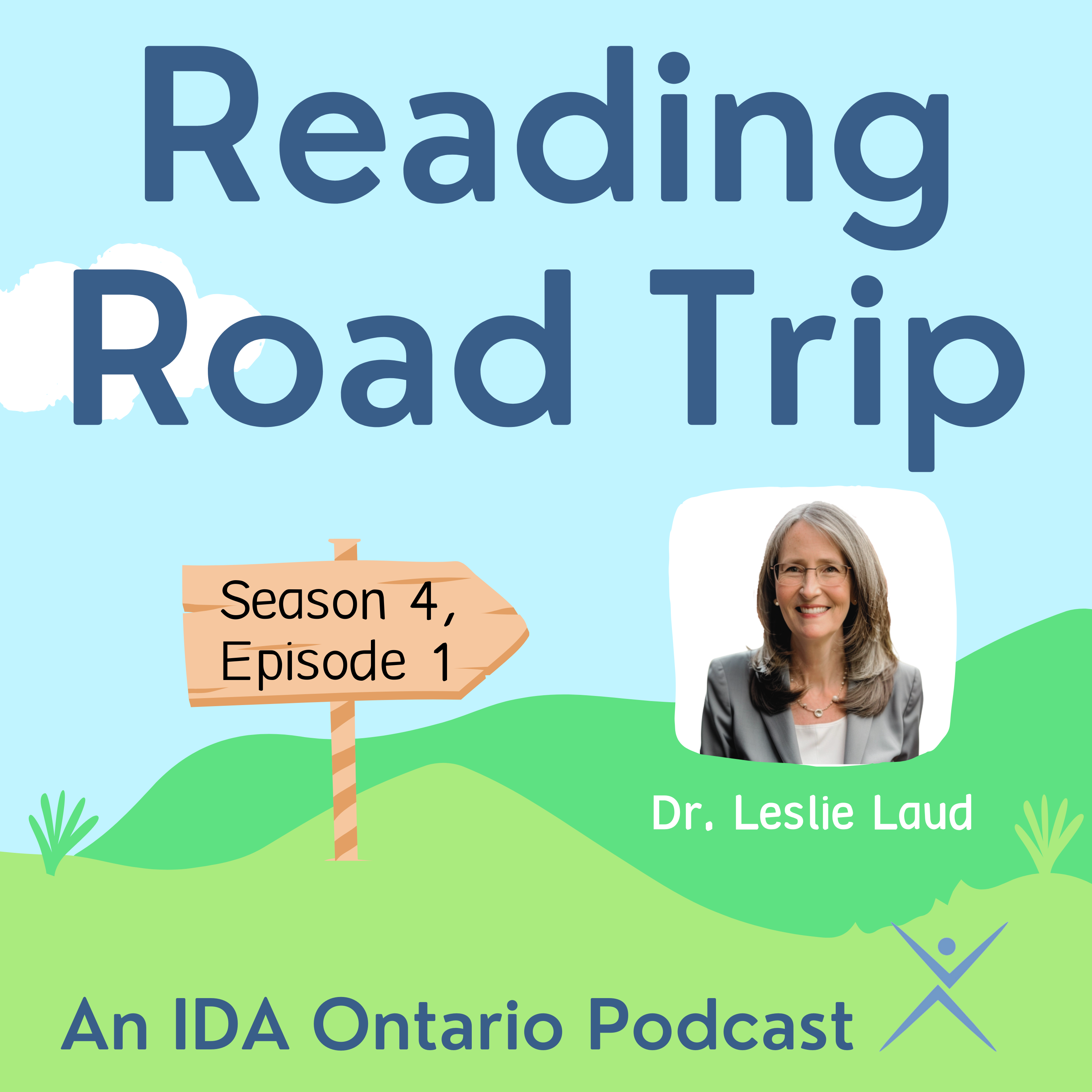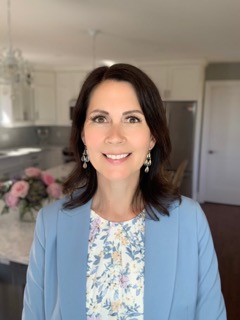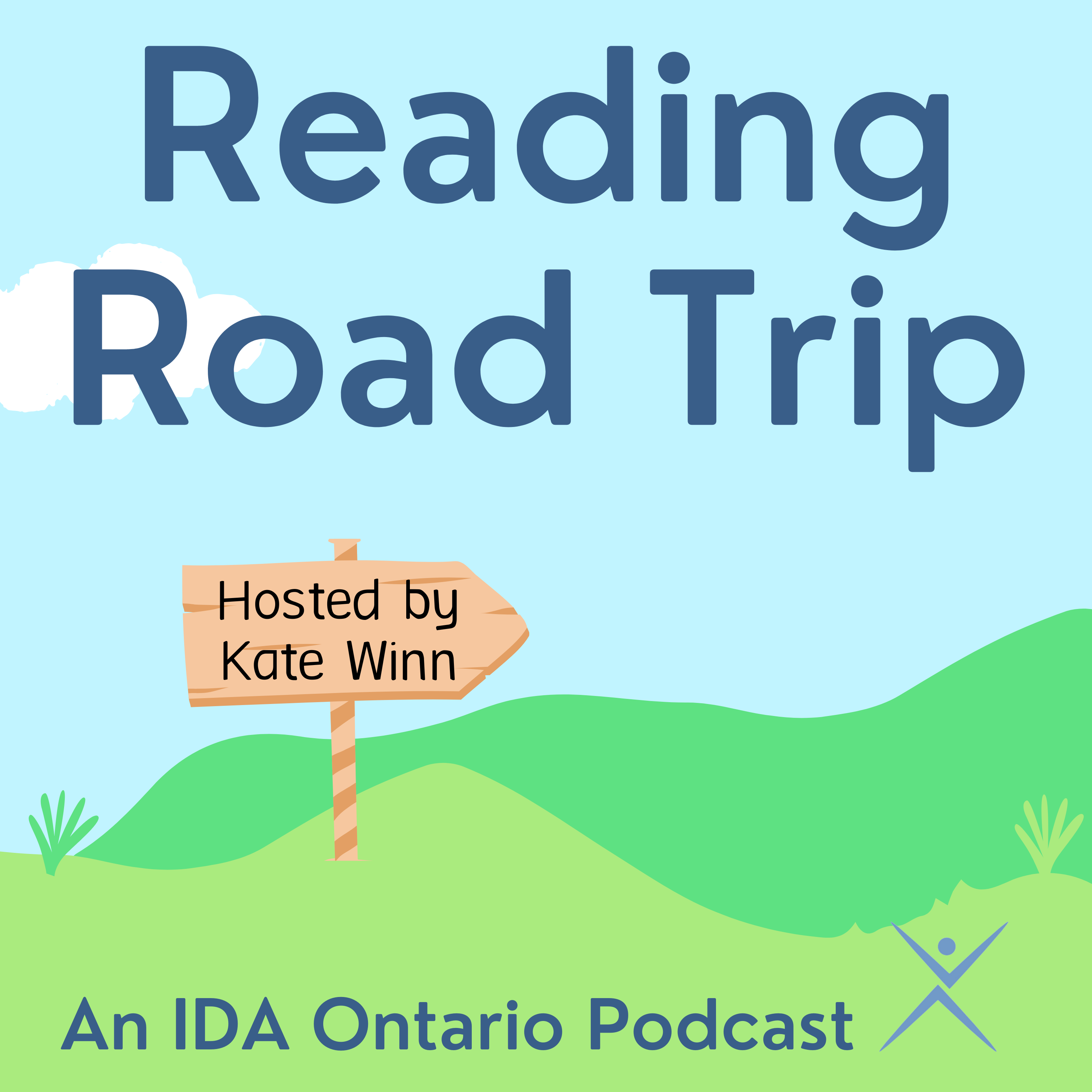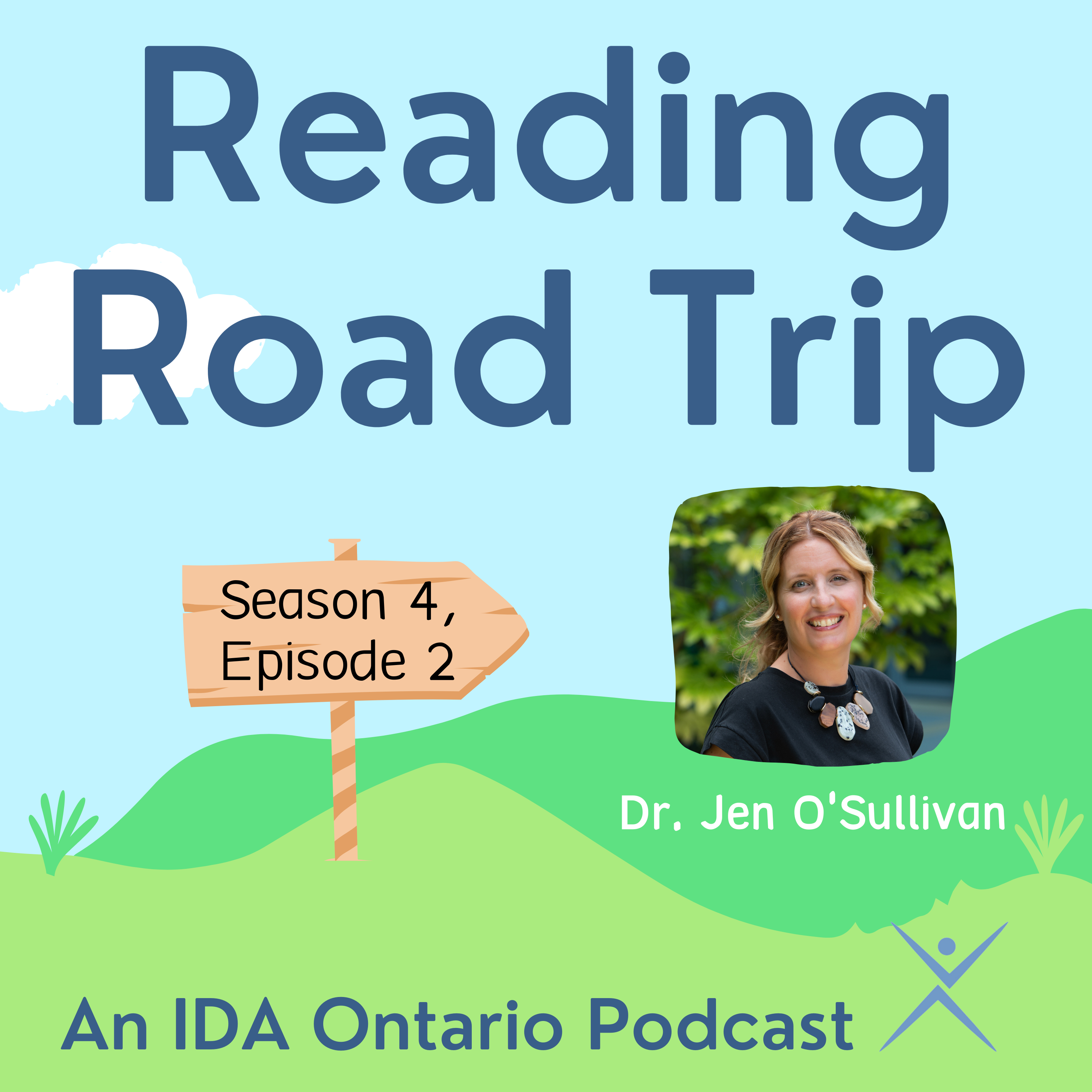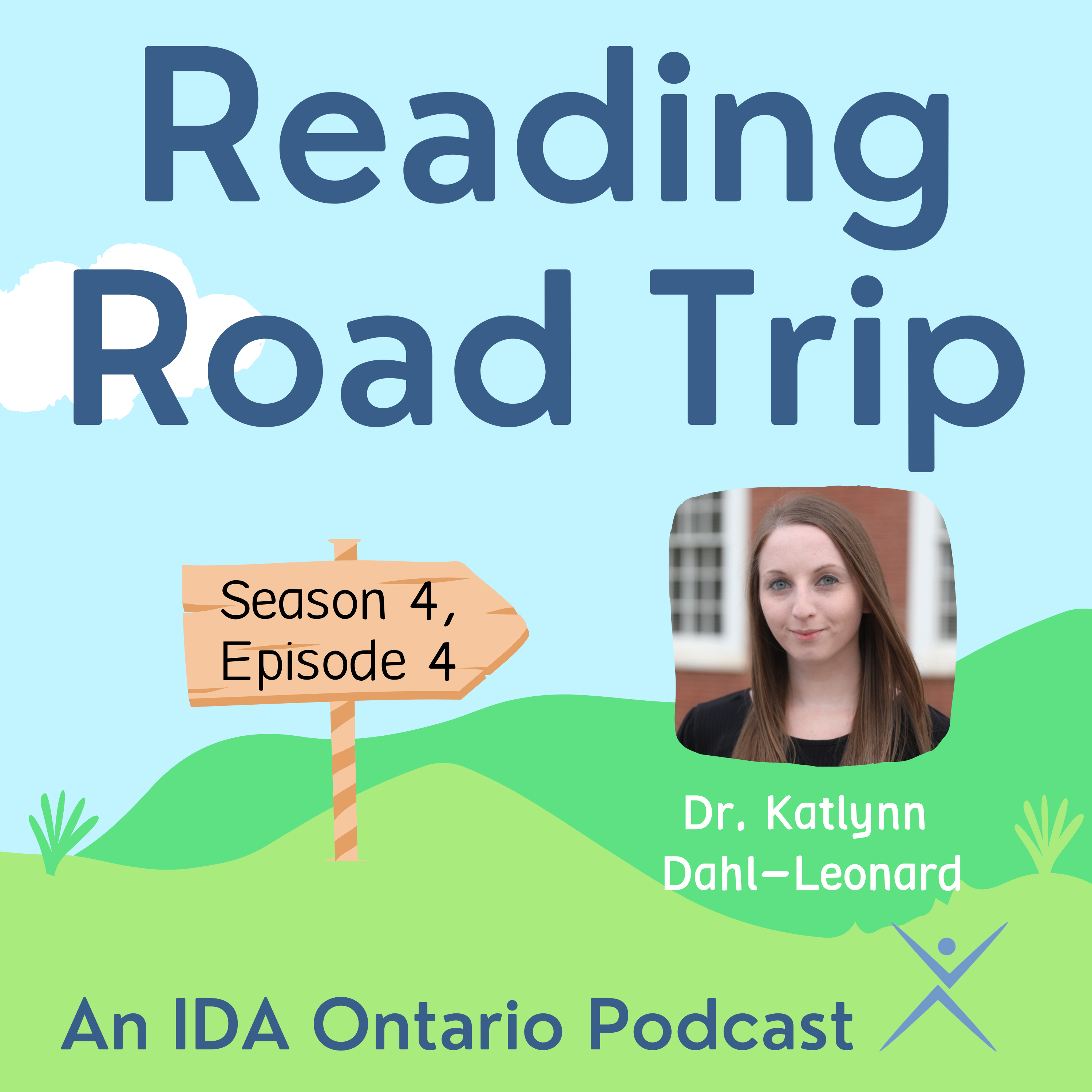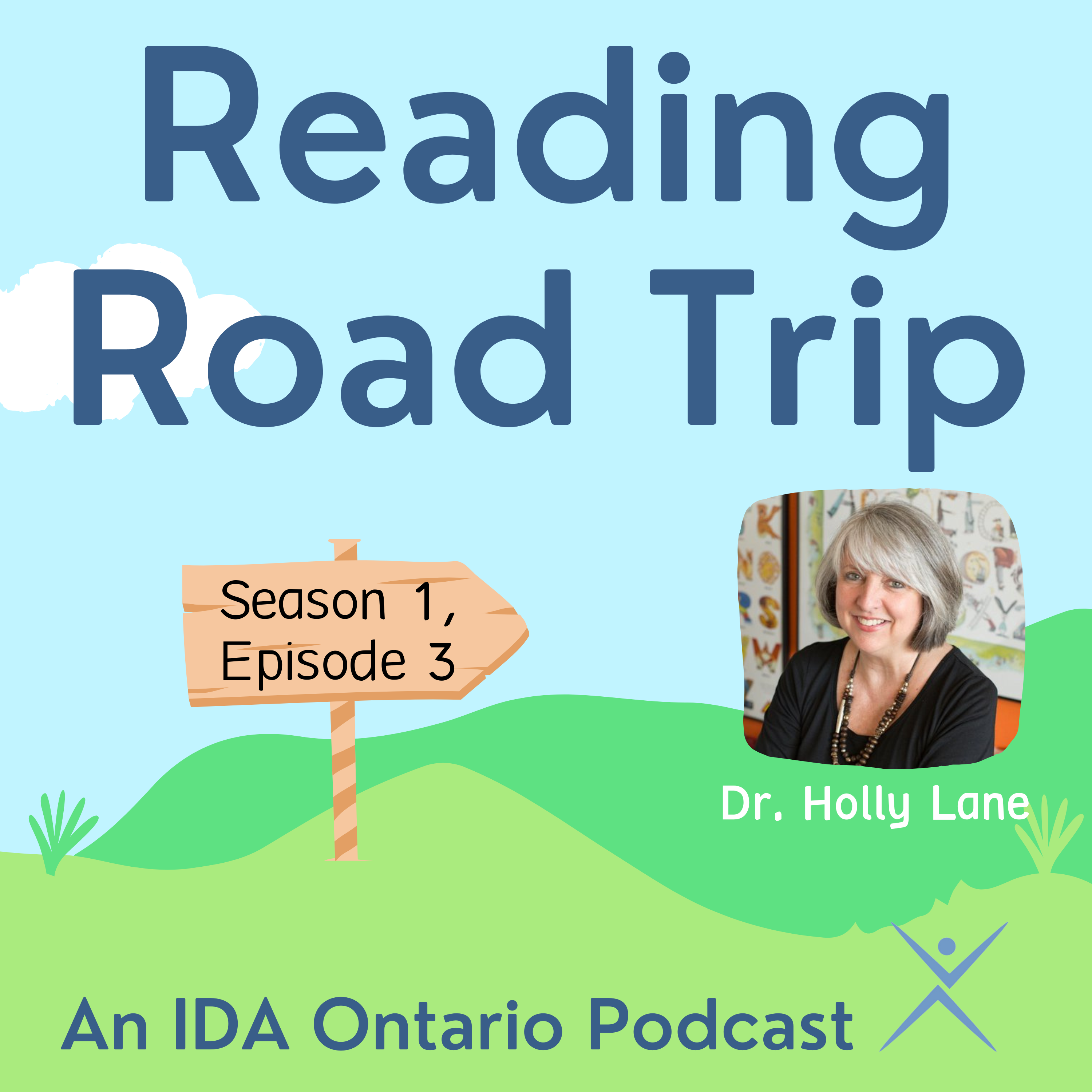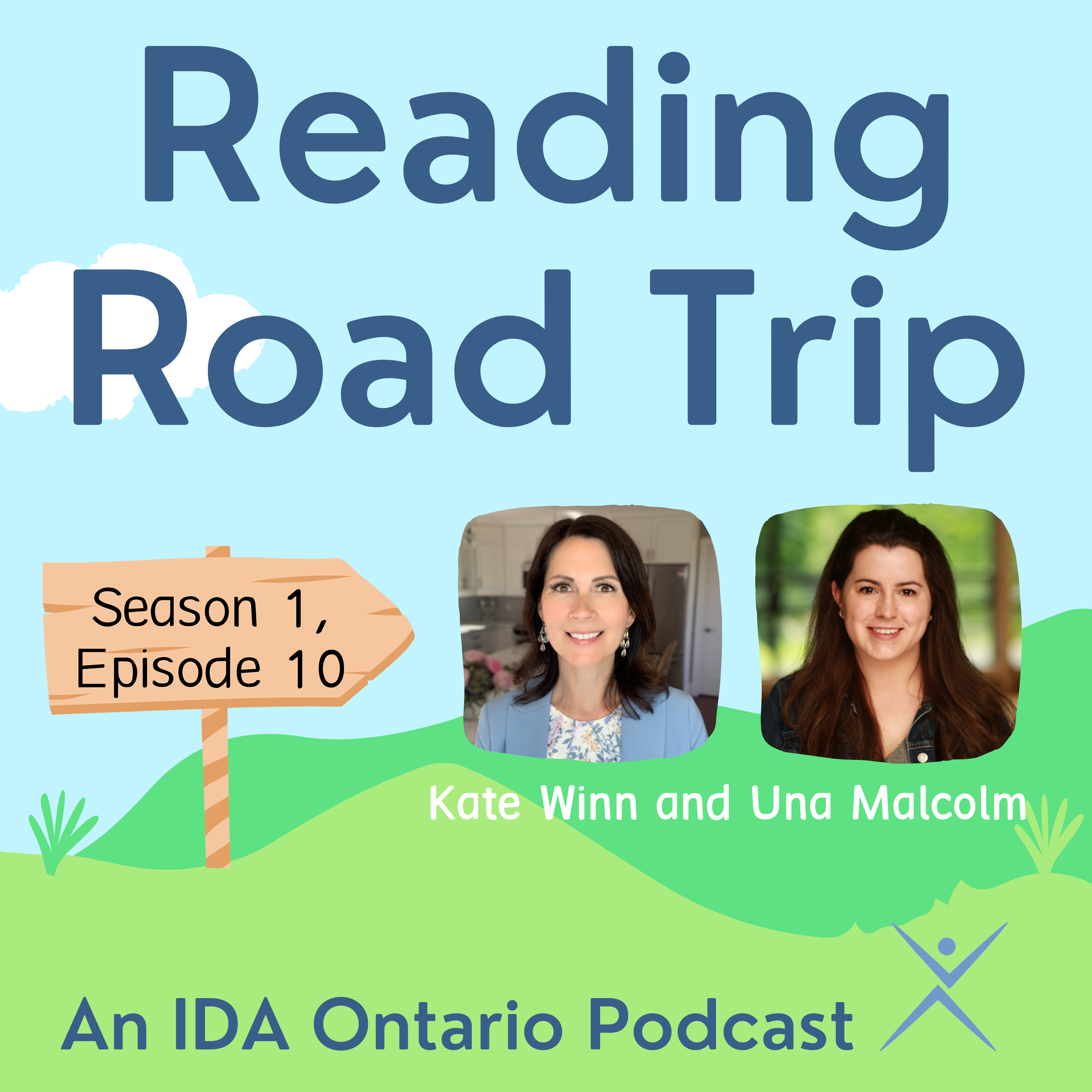Episode Transcript
[00:00:05] Kate Winn: Hello to all you travelers out there on the road to evidence based literacy instruction. I'm Kate Winn, classroom teacher and host of IDA Ontario's podcast Reading Road Trip. Welcome to our season four premiere.
Before we get started, we would like to acknowledge that we are recording this podcast from the traditional land of the Mississauga Anishinaabe. We are grateful to live here and thank the generations of First Nations people for their care for and teachings about the Earth. We also recognize the contributions of Métis, Inuit and other Indigenous peoples in shaping our community and country.
Along with this acknowledgment and in the spirit of truth and reconciliation, we'd like to amplify the work of an Indigenous artist and today we are sharing the Cedar School Decodables series from Strong Nations Publishing, written by Emma Metallic and illustrated by Natalie Lauren.
Welcome to Cedar School. Join Liv, Tom, Gus and Belle as they learn on the land and explore Mi' Kmaq teachings with their teacher Ms. Sam and the school's Mi’gmaw Elder Jen. With charming illustrations and simple storylines, this decodable series engages students as they practice their reading skills. Each book includes a pre reading review of non decodable words and many of the books introduce special words related to Indigenous teachings. Talking together prompts facilitate discussions led by the reading teacher.
Developed in partnership with Dyslexia Canada, Cedar School Decodables are recommended for use in kindergarten and grade one classrooms. This series is designed for students who have previously learned short vowel and consonant sounds and additional phonics skills are developed progressively throughout the series.
So I can tell you I have this set of 20 books. I think they're really well done. So if you are looking for decodable books, I suggest you add these titles to your home or classroom library today. And now on with the show.
[00:02:04] Kate Winn: It is such a pleasure to introduce our guest this week here on Reading Road Trip, Dr. Leslie Laud. Dr. Leslie Laud supports districts and states nationally with strengthening writing instruction. She has taught in both general and special education and worked as a principal. She now leads research studies. She holds a doctorate from Columbia University.
She has served as CO PI and Lead PI on federally funded large research studies of writing instruction, publishes empirical studies in peer reviewed journals and presents frequently at national conferences. She currently teaches a grade 2 after school writing club and is a newly avid gardener. Welcome Dr. Leslie Laud. Thank you so much for being here.
[00:02:47] Dr. Leslie Laud: Thank you so much for having me.
[00:02:49] Kate Winn: So we wanted to bring you on the show today to talk about thinkSRSD. It is just taking the literacy world by storm right now. The classroom Teachers, everybody, just loving this, this approach to writing instruction. You are the director of thinkSRSD and the best person to be here to, to help share so much information about it with our listeners. So my Wonderful co producer, Dr. Una Malcolm and I have come up with a list of things that we want listeners to know about thinkSRSD. I use it myself, love it. And I'm hoping that I can, you know, sort of prompt you with these things and that maybe you could fill, fill that in for listeners and give them more information. Sound good?
[00:03:29] Dr. Leslie Laud: Certainly.
[00:03:30] Kate Winn: All right, so the first thing we want listeners to know is that thinkSRSD is based on both research and evidence. We are big on that here at Reading Road Trip. What can you tell us about that?
[00:03:42] Dr. Leslie Laud: Absolutely. So thinkSRSD is based largely in SRSD, which stands for Self Regulated Strategy Development.
We have also culled from other evidence-based practices that have been through large-scale trials and found effective as well in the teaching of writing. We've amalgamated these, but the core has always been SRSD and SRSD has five decades of research behind it.
Nearly half a century.
And in the most recent years we've had an increasing number of randomized controlled trials, RCTs, which are pretty much the gold standard in the research world.
These have all consistently found that this approach results in significant gains in students' writing. So it really is science of writing.
[00:04:38] Kate Winn: That's wonderful. You mentioned SRSD and thinkSRSD you mentioned has been adapted to augment it with further evidence-based practices for teaching writing at the sentence level, using it to support students with higher-order thinking. Can you share how thinkSRSD has enriched srsd?
[00:04:58] Dr. Leslie Laud: Sure.
So thinkSRSD aims to raise overall ethical ELA literacy performance.
So it's reading and writing that we're looking at addressing in this approach.
And we do so. We've collected data that's all publicly available from nearly 100 schools that we've worked with over the past decade. And we just published this and it's going to peer reviewed publication. We just found out this week.
And in these schools we found that the average school makes a 7% gain in overall ELA. That is a combination of reading and writing working together to lift outcomes for students. It's also considered significant because the standard error of measure is 3% and if you double that and go beyond that, that's considered significant.
So we definitely have our own research and our own gains. SRSD will get you gains in writing. What thinkSRSD will do is get you gains in writing and ELA and lead to overall ELA proficiency gains. But to answer your question about how we augment it, it's been an amazing wild ride and fun journey over the past decade. I've worked very closely with Dr. Charles Haynes because there was a barrier.
This approach, SRSD had been around for half a century and wasn't scaling, wasn't taking hold.
So we really looked at what are the barriers, why is this not taking hold? And the biggest was the sentence level instruction. So we merged Dr. Charles Haynes's sentence level work in at the gist.
Shout out to Dr. Haynes. Sharon Vaughn. Kay Wijemakumar has done a lot of work around sentence writing in terms of main idea. So there is a long rich history. But I Learned it from Dr. Haynes, so I give primary credit and gratitude to him. We also augmented it because while we were happy to see gains in writing, they weren't always translating over to larger ela.
And so, coming from the literacy world myself, I worked with my schools and our team to bring in support for reading instruction, diving into some of the SRSD research, but also bringing in the standards. I know in Canada schools are big on teaching point of view.
So these larger literacy standards, we've been bringing those in and augmenting it to support the reading that the students do, particularly around the reading standards.
[00:07:44] Kate Winn: Thank you.
[00:07:45] Kate Winn: So fact number two about thinkSRSD that we'd like to delve into is that this can be used to beginning in kindergarten all the way through the grades. Could you speak to that a bit?
[00:07:56] Dr. Leslie Laud: That is the power of it. And the genius of Karen Harris when she put together this framework, she created it and then studied it with colleagues, including her husband Steve Graham. But the genius of it was how well it is pedagogy.
And it took me years and years to really understand that it is just really strong pedagogy. And so the same pedagogy works all the way up through the grades.
And we see it working in kindergarten more so to develop oral language vocabulary.
And then all the way up to high school. We had these high school teachers reach out to me recently in tears, crying while they were scoring their end of year essays for their kids, saying in a 20 year career they had never seen this much growth in their end of year To Kill a Mockingbird essay.
I used it with my own students in middle school and upper elementary and saw these incredible gains. So it does stand the test of all the different grades.
[00:09:00] Kate Winn: Well, and I can speak from a bit of personal experience teaching kindergarten, I have been using thinkSRSD. I guess this is the second year I used a part of last school year and then this past school year that has just ended. And I just find it so amazing. And you've given me lots of opportunities actually to present on my experience to other kindergarten or early years educators when they're starting to learn a bit about thinkSRSD. I love when you have me just kind of do the first 10 or 15 minutes to open those sessions and, and just show them where things can start and then the rest of the day you take them and show them where they can go. But I love, in kindergarten I always talk about the fact that when we talk about writing, we've got the letter formation we're going to do explicitly, systematically, we're going to teach that, you know, make sure that we've got that with kids. We've got the spelling piece that's part of our phonics program, which is great, but there's that, what are you writing about that composition piece? And a lot people think, well, the kids aren't forming their letters yet and they don't know how to spell the words yet. So we'll leave that for a bit. But we don't have to. We're starting that in kindergarten. And that's what I love with, you know, the different mnemonics that you use and the different, you know, structures that we have to, to help the kids to start composing, to start organizing their ideas, to start understanding how to form good sentences, how to form good paragraphs. All of that can start in kindergarten. And, and I know it's true because I've been doing it with my students. So that's amazing. So if we're doing that in kindergarten, just imagine how far we can take those kits.
The fact number three that I want to ask you about is the fact that this can be used with any program or materials. It's not like you have to get thinkSRSD and that's what you're doing. And it's this whole package you can use this with. So if you're, you know, if your state, your province, wherever you are, if something is mandated, you can still use thinkSRSD. Tell us about that.
[00:10:47] Dr. Leslie Laud: I would love to tell you about that because it is one of the most powerful, beautiful elements of this. I do just need to give you a shout out because evidence based practices cannot make it to the classroom unless we have translators.
You have been a very important translator showing kindergarten teachers all over Canada and the world, the people who follow you, that this can be done. Lindsay Kemeny has brought it into first grade. Paul Banwaite in Peel, Canada is showing teachers all over Canada, Emma Nana in New Zealand.
So these people are the translators. And you are ahead of the pack and can't thank you enough because otherwise there are two different silos. There's the research world and there's the school world. And it's those of you brave front runners who are willing to give it a shot and try to make it come alive in the classroom that are clearing the pathway. So I just wanted to thank you for that.
[00:11:44] Kate Winn: Well, thank you for saying that.
[00:11:45] Dr. Leslie Laud: Sure. And now I'll move into how this can be combined with programs.
[00:11:51] Kate Winn: Yes.
[00:11:51] Dr. Leslie Laud: So in the States, as you know, schools purchase a large box of curricular materials.
Canada isn't doing that as much.
So we are working with more and more Canadian schools to help them develop how they can bring this into their own materials.
I had a meeting with a wonderful school in Canada this morning and they said, do you have texts? And I hadn't understood the question. And I said, well, there's common lit, you know, that's one of my favorite places. I like common lit because the texts are rich and complex.
And then they said, could we use this with our text? And I hadn't realized that they had mapped out for the year the novels, the picture books, the articles that they'll be. And I said, yes, yes, that is exactly where it goes. It goes in with that repository.
This is a struggle for the Canadian schools, but ONlit, shout out, has made it a whole lot easier by creating these free materials. What a gift you've given to not only your nation, but I'm talking to schools in Australia, news and around the world about this wonderful treasure trove that you have started.
So, yes, it comes into the science, social studies, ELA, all of the materials that you're already using, which is wonderful.
[00:13:12] Kate Winn: And thank you for the ONlit.org shout out as well. And yes, we do have some great materials for people getting started with thinkSRSD. There are some great materials. If you teach grade three, we've got lots ready to go there for you and hopefully we'll be adding more grades soon. So onlit.org and we'll put links in the show notes as well. So fact number four is that thinkSRSD can be used with both informational and narrative writing. Tell us about that.
[00:13:39] Dr. Leslie Laud: Yes. So that has been a really fun journey. We just recently published a blog on this which is there and available at the thinkSRSD website for free. But this has been a journey.
And about 15 years ago, when Common Core was first coming out, we learned that there are three text types, narrative, informational, opinion, that we would want to be writing in. Before that, it had been four persuasive, expository, descriptive, story, but this came out with three.
And when those three came out, our natural reaction, which I look back, and it didn't make a whole lot of pedagogical sense, but I can see how we thought this way. We divided the year into three parts and spent a third of the year on each. No, we quickly learned, working with schools, that that's not how it works.
It's.
You could see why it happened, but that's not how it worked. And within a couple of years, we had straightened the ship out.
And yes, we've also learned to keep everything as simple as humanly possible.
We have two mnemonics. TIDE is for writing informational or opinion.
And then we have C SPACE, which we use for story writing. And that's it. Just two simple mnemonics. And we use this approach across those.
TIDE, which is informational and opinion, we introduce at the beginning of the year, and we use that to respond to science, social studies, ELA. We're using it all year long. We begin quickly mixing in some opinion writing, and we talk about the features that are distinct for opinion writing.
But we use it all year long, toggling between informational opinion rights using TIDE, and at the same time, we use it for narrative writing. At the beginning of the year, we introduced C SPACE as a reading comprehension technique. Shout out to Trina Spencer and the people who've come up with story grammar. Multiple researchers have been looking at the importance of giving that C SPACE or a structure close to that to students to help with comprehension. We use it for comprehension for the beginning of the year.
A couple of months in, we flip it, and now we use it to tell a story.
We do a unit on storytelling, and then we come back and the rest of the year is more tied and using for informational and opinion writing. But that is the best timeline that we figured out. Took us a decade to pound that one out, but schools seem really happy with it.
[00:16:19] Kate Winn: That's so great.
[00:16:21] Kate Winn: Fact number five about thinkSRSD. It reduces the teacher time required for scoring and marking around writing. So in kindergarten, I have gotten away from having to sit there with stacks of essays and that sort of thing, right?
But there was a time where I was teaching grade seven and eights and I was marking their writing, and you'd have the pile. And so tell us about how this can actually be more efficient. Time saving for teachers, I think we like this.
[00:16:48] Dr. Leslie Laud: That is one of the big selling points. Teachers sort of watch it, figure it out, and it's not something we speak about a whole ton, but they're just like, you just gave me my life back.
So what we do is I used to have those big stacks of essays to score and there's always that teacher guilt that I'm not getting all the feedback to the students.
When I began using this, I cut my feedback time by about 10, you know, from 10 hours to one a month. And my kids’ writing soared. And we see this in every school that we work with.
So rather than usual - carrying the burden of doing all the scoring and all the feedback, we share that with the students and we right off at the beginning of the year, we teach them how to self score. Now I used to give a rubric and say, go self score. The kids didn't know how. Maybe I'd even teach it once. They still didn't know how.
Now we front load in the beginning of the year, here's how you score. And we put their writing up. They all want their own writing to go up in front of the class.
And we model how to score.
And they get into these debates, no, don't give the point. Yes, I think you should. And they really internalize the features and learn how to self score so that every time they're finished, I'm done. No, you're not. Please colour code, self score, peer score. And then at the end of the week, we always score a below that didn't quite make the standard. The kids all want theirs to be the below because they love the feedback and an on level. And I make sure that they represent the struggles that I'm seeing my students produce as I walk around the classroom and eyeball.
Every week or two, we might pull kids back to a small table, eyeball their work, see what they need, and then put up a piece and score that in front of the class so that they're all getting the conferring. I used to confer with each student individually. It was not the best use of time because they had such shared needs.
Now we're able to do this every week, put the writing in front of the kids and give that feedback that's targeted, knowing that it's what they were struggling with that week.
[00:18:58] Kate Winn: Well, and what I love is how you keep going back to the achievement and the success that you're seeing. Because, I mean, I think any of us would be on board with, oh, this reduces teacher marking time. But is it worth reducing teacher marking time if student scores are going to plummet because they're not getting that feedback from us. Right. But you have the data to prove it that this is still so successful for the kids. So that's so great to hear.
Another wonderful fact about thinkSRSD is while certainly there are some resources that people could choose to pay for some trainings, generally you can use thinkSRSD for free. Tell us about that.
[00:19:37] Dr. Leslie Laud: Absolutely. And we are low capacity, so we could not be more excited that we are seeing this scale. We began by posting free materials at our website and that became like hotcakes. Like we were getting hundreds of hits every day. We had to keep upgrading the website because so many people were coming and taking woes for free. But then, like, Facebook groups hit and people kept writing to me and saying, when are you going to start one? And finally I threw one up. And now I'm putting in more hours than I should every day, guiding people, answering questions, and I'm seeing a phenomenon. So a couple of years ago, we won a federal grant for $11.3 million to figure out how to scale this.
And we made little inchworm efforts, but we just didn't. We just couldn't figure out how to get to scale. It never occurred to me that a Facebook group would be the mechanism that would get this to start to scale.
And people. The most exciting part of it is that people are watching other people's posts and then they timidly put one up and say, I haven't bought anything. I haven't. I've just gone to the free website. I've just watched the other people and here's my first attempts. And then a dozen people jump in to coach them, give them feedback and encouragement. And I'm watching this scale before my very eyes. And that gives my heart wings because that is what I've wanted to do ever since I found this 20 years ago, is just get it to every teacher.
[00:21:03] Kate Winn: The eighth thing that I want to talk about. Oh, no, only at number seven. The seventh thing is that thinkSRSD can support Canadian curriculum, which you would call standards, but our curriculum expectations are what we call here in Canada and content as well. So you are American. thinkSRSD, I believe, is generally American, but it can absolutely support what we're doing in Canada. Tell us about that.
[00:21:27] Dr. Leslie Laud: Yes.
So we have dug deep into your assessments and into your curriculum and program because we've been supporting so many schools. Maybe half our schools are now in Canada.
So we've dug deep. We've met with the curriculum team leaders and begun understanding the intricacies.
So, for example, in Nova Scotia, we developed activities or we found text sets and videos about the use of the Gaelic language, which at one time flourished and then has dissipated. And there's a movement to bring it back. And so we're working with schools there on text sets that are relevant to the area.
And we've also looked, as I had contrasted before, point of view is a standard in the States, but it has much more emphasis and it's much more highly recommended and prioritized in Canada. And it's a beautiful standard.
So we've just been digging in with the different schools and supporting them along these lines.
[00:22:33] Kate Winn: That's wonderful. And, you know, to those Canadian teachers who are listening, whatever materials you have, you can still use this approach with your materials. You don't have to, you know, wait for something to be created that's Canadian. You can use your Canadian text. You can use the resources that support our curriculum expectations and still use thinkSRSD sort of as that vehicle, which is wonderful. Now I'm at number eight. The eighth thing that we would like people to know is that thinkSRSD builds motivation and confidence in students. So we're not just talking about robots that are checking off all these boxes and getting the good grades.
We want this motivation and confidence as well. Tell us about how that happens.
[00:23:15] Dr. Leslie Laud: That is just the motivator, right? That is what keeps us going. It's not doling out the A's that they really do deserve. It's not seeing their ELA scores come in sometimes 20 points, 25 points up from last year. That is all moving. But it's the stories of the kids confidence. And I remember seeing this right away when I taught middle school.
There was a girl who didn't make much eye contact with me. And I think it was because she had disappointed teachers. And she was very attuned to what we thought of her.
And when I showed her an exemplar and modeled writing and gave her a scale and helped her check it off, she looked at me one day and she made this locked in icon. She said, this is what you want me to be able to produce. And these are the features. And it was all coming together.
And it was like she'd been a sleepwalker and now she woke up and now she was in charge. And it's that human transformation that is utterly priceless, especially in middle school, to see a girl where they're vulnerable for losing confidence, to see her wake up, find her own grounding, find her own feet have her own voice and take control.
And that is what we see the kids do over and over again. My second grade group, by about the fourth or fifth section, we were going to do an activity and I saw their pencils moving on their paper and I said, can I ask what you're doing there? And they said, we're writing and they don't want to be rude. So they were tentative about it and they were like, could we. And I said, can you hold that? And sure enough, they had like finished an essay while I was talking to them.
And these were kids who would only produce one sentence at the pre assessment. And so we see that just that force, it's hard to describe, but it gets unleashed. We see it every year on the state assessments. I've started calling it magic pixie dust when I get a flood of emails that the kids were all writing independently. There were no tissue boxes, they wouldn't stop. Parents had to pick kids up at the end of the day because they were so invested and they'd never seen anything like it before.
[00:25:27] Kate Winn: I think this would be a good time. I want to just throw in a question about the self regulated piece of the SRSD because as a kindergarten teacher I have to tell you that, you know, I came into kindergarten nine years ago, lots of talk about self regulation and a lot of it was a little airy fairy and a lot of it was a little like, is there any evidence or research to these things? You're telling me here. But I found it so fascinating with SRSD learning about, you know, we talked about on the podcast one time, some studies that, you know, thinkSRSD, sorry, not thinkSRSD, but going back to SRSD, some studies that without this self reg components students would still see gains, but with those self reg components you see greater gains. Like that's important. You don't want to leave that part out. So how would you explain to listeners what this self regulated piece of SRSD actually means?
[00:26:22] Dr. Leslie Laud: It's hard even for researchers to parse out what are the mechanisms that are causing the gains.
I know about the study. I believe it was Zimmerman or he may have been somebody who summarized it. But I do know about that study. It could have been Graham. I believe that they introduced multiple elements, goal setting and peer feedback.
And I believe it's the goal setting that has so much power. I've read other studies that teaching self talk versus not teaching it leads to the same outcomes in the end. However, when you've taught self talk, you've spent less time teaching writing.
The other group spent more time teaching writing, but yet you got the same writing growth.
So there's a double benefit to teaching the self talk. So I highly recommend it.
What facilitates the self regulation is I believe the mnemonics make the self regulation possible because they enable the kids to call up and remember to use the pieces. The scales make the self regulation because they are a concrete tool that kids can use.
But the most powerful part of this is the power routines or the power cycles.
Adele Diamond is one of the leaders in executive functioning research and she says it's the doing it over and over that gets the kids self regulating. I mean you’re kindergarten, you know that when you lay a routine you're good to go. They'll have that routine.
So I think the deepest, most powerful work is the ongoing power cycles. Not a one and done, but to do it over and over until it becomes part and parcel of the routine of how students approach writing. And all these tools are supporting that. But it's the regular practice, application, feedback, goal setting.
[00:28:19] Kate Winn: Since you mentioned the power cycle, could you just tell listeners what that stands for? The letters in power.
[00:28:24] Dr. Leslie Laud: Power comes from Carol Sue Englert. She was studying self regulated writing all the way back in the 90s and her were early 90s and her work was pure gold.
SRSD. The earliest I can find is the mid 90s. They brought in POW. I think she was the original to use power and it stands for plan, organize, write, edit, revise.
And it's such a brilliant tool that she came up with in these early, early studies. She was having the kids write it and then check it off as they took themselves through each phase and that's what puts them in charge of their own learning.
[00:29:04] Kate Winn: And I really love with the mnemonics too. I just like the idea of, you know, our school is starting to dip their toes into it school wide into thinkSRSD and just the idea of having the same mnemonics. Because I think every, every teacher who's a good writing teacher, you're going to have mnemonics you use to help the kids remember how to organize their paragraphs or whatever. But to me, like even with everything I've learned about cognitive load lately, just the idea that when you go from grade four to grade five, the teacher's still going to be using the same one. Right? It's not the relearning what something stands for and adjusting and all of that, just keeping it consistent throughout the grades I think is a really wonderful thing. When you have that school wide implementation as well.
[00:29:42] Dr. Leslie Laud: Oh yes. And how they will complexify it in each grade so, you know, as seventh and eighth grade, that, that's very different from the younger grades in terms of what's required.
And so each year the mnemonics are comfortable and familiar, but how they're using them and how the teachers are defining them and the expectations are increasing.
[00:30:02] Kate Winn: Yeah, absolutely.
So the final thing I wanted you to speak about was just you did touch on Facebook groups earlier, which I love, but there really is a wealth of support out there for those implementing. So I know in Canada there are some full boards or schools, you know, they're, they're getting right on this larger scale. But even for just an individual teacher, maybe right now who's just thinking, huh, okay, this podcast sounds a bit interesting. You know, how could I get started? What kind of resources are out there? Could you tell people about that?
[00:30:33] Dr. Leslie Laud: That, Yes, I love that question. I would go to thinkSRSD.com and look at the free resources.
There's a whole starter kit there. And then I would go right into the Facebook group. Follow us on Twitter. We do tweet out pictures from classrooms every day. And Instagram, we have more and more teachers sending us reels and we're putting them up on Instagram. But the Facebook group seems to be the largest daily community where we've got questions coming in and then generous coaches, not just giving ideas, but the encouragement at Facebook has been important.
We have a course that's been subsidized by all the federal grants that we've gotten. So we're able to offer that at a very reasonable low cost. We do offer PD to schools and we offer a national network.
So a school may decide we want to figure this out and try it out on our own. But we do want to be part of the thinkSRSD network because we get to together every month. We have check ins, we have cry on each other's shoulder at how hard it is to get going in September with anything.
And then we go into breakout rooms and we have experienced coaches in each breakout room who guide the coaches and the new teacher leaders. And it's like speed dating. They set up meetings like they'll trade numbers and a breakout and then go meet the next day and trade more resources. So we do have that national network that we run monthly. Monthly, which is really a lot of fun.
[00:32:00] Kate Winn: And you know, and I do, I think, I follow thinkSRSD on all of the social media channels. But you're right about that Facebook group and it's really truly supportive. You know, I'm in a lot of different Facebook groups and like, people might post things and, and it's hard in some of them, you know, especially the ones that are called science up reading, you know, whatever that, you know, when somebody posts something that's really, really separated from where evidence and research are, then I understand why people kind of feel a need to weigh in. Right. Like, sometimes those things are tricky. But I just do find in the thinkSRSD group the support that you get, like, even just people weighing in to say, oh, that looks awesome, or, you know, those sorts of things. But I know even when I did my first gist sentence, I had shared a picture, if, you know, the chart paper and how we did it all. And then somebody said, oh, did you know there are visuals that you could use? So it wasn't somebody saying, you teach kindergarten. Why aren't you giving them visuals? Right. It was somebody in a very helpful way saying, did you know someone created visuals? Because then it's not just the words. You have these pictures, you know, if we're doing a gist sentence and we want it to be like, who was this about and what was the action and when or where. Little pictures to help them know what we're talking about. So I immediately clicked on the link and it was actually, I think Tracy Thorstensen, who is. Is a very active thinkSRSD person who had created this great resource. And so then I printed those off and I used them. And the next time I shared something on social media, I was able to show that, yes, I had those visuals now. So it's just really people helping other people. And, you know, depending on what grade you teach, there's going to be somebody in there who can weigh in and answer a question for you. So absolutely lots of support there, which is great.
[00:33:41] Dr. Leslie Laud: Yes, it is a beautiful community.
[00:33:44] Kate Winn: And the last thing I wanted to say, kind of for following up on that one. So what about implementing at the school level, what would you say are some best practices? I know we are trying to do it a bit at our school, but the problem is when there's no release time for teachers necessarily. Right. And there's not necessarily, you know, money for resources that people might need and that sort of thing. It's a little bit harder and, and I understand that teachers don't want to necessarily go on their own time to take the course or to read the, the book and things like that. It makes it a little bit harder. So school, we've been, like I said, sort of dipping, dipping our toes in.
They've been introduced to the mnemonics. People have introduced them to their classes.
We had a month where we focused on gist sentences that that piece that you've augmented SRSD with. And you know, every grade from K to 8 was doing just sentences. And we talked about it at the next staff meeting and everybody who shared got a little prize and that sort of thing just to. To motivate people a bit. But in terms of scaling up at a certain school level, what advice would you give people who are listening?
[00:34:49] Dr. Leslie Laud: We are innovators, Kate. I am really impressed with how you innovated in your school.
So about two years ago, something happened that utterly blew my mind. And it felt like the most beautiful, like mushrooms popping up everywhere. I had never foreseen it, anticipated it, and couldn't believe it happened before my very eyes.
And that is a coach took our elearning with, I think, one other teacher, Owen Withey, Wisconsin.
And she, I thought had five faculty meetings. Turned out she only had five PLCs.
She went into these. She showed the practices to the teachers, photocopied them some things.
They agreed to go off and try it at the same time. Devorah Sassen in New York was doing the same thing. She was meeting with the school once a month and giving them one little tip.
I ended up meeting with her school and I cried in June because the teachers were crying because they were holding up their pre and their posts. I'd had nothing to do with it. She was giving them tips once a month and they were hungrily grasping onto it and using it. And the whole school's up and running and in love with this approach.
The school in Wisconsin, the coach told me it's up and running and the majority, you know, there's always one, but that's up and running in the majority of the classrooms. And I held my breath and her scores came out and I saw significant gains in her school. And I had had no contact beyond just her taking my course with one other teacher.
So coaches are spreading this, the world's record that I don't necessarily recommend this. I don't know if everybody can do it. But there's one coach in Massachusetts who told I she got it up and running in 23 classrooms out of, I think maybe 40 in her whole district, multiple schools. And all she did was take my course. And I said to her, I got on a zoom. I said, how'd you do this? And she said, well, I did the course. I said, when you're a coach, there's no way you did it during the school day. You're tied up. She's, you're, you know, my job. You're right. I took it home, put my kids to bed, and went on. And I was like, once, twice. And she wouldn't answer me. I think she was dodging. I think she went on once.
She figured out the majority of it. I'm so impressed. If she went on once, that is massively impressive. She went into the school and she began modeling lessons in the classrooms. And now she said she sent out a survey and I saw it. And out of the 24 teachers, all 24 said, yes, their students have grown significantly and yes, they all want to continue into next year.
So I think you have to have that one lightning rod.
And a coach is ideal. But we've seen a single teacher do this and you grow it. It's the kind of thing that doesn't go away because the people who do try it see that it works, and then it sort of just hangs on. And then slowly, over time, you know, attract more bees with honey. People begin to come and get interested in what's happening. I did hear one coach say, teacher jealousy is a real motivator. When her scores came in up 20% in her school in certain grades and not others, the other teachers jumped on.
So we have got it, I believe, to the point where it's no longer a journal article. That's hard to figure out, but it's live videos, a network, a Facebook group where I think schools and it's been augmented. Like the barriers have been addressed in what we're doing with Thinkus rsd.
[00:38:25] Kate Winn: Well, this has been wonderful. Is there anything else I haven't asked you about yet or that you've thought of that you want to share with listeners before we go?
[00:38:33] Dr. Leslie Laud: No, I just want to thank you and ONlit and all the people who are tirelessly putting in their own time and energy to do better for kids. And I've lived through Reading First driving readers. You know, I've been around 35 years. This time's different.
And I really do believe that we are turning the tide and that the schools are moving forward. I think we're going to look back years from now and say that was when it happened. And, Kate, you will have been a force in the area of writing and all the work that you do.
[00:39:03] Kate Winn: Well, thank you. And thank you for everything that you do with thinkSRSD, with getting the message out, with supporting people. It's wonderful with doing podcasts like this. It has been a pleasure to talk to you today. Dr. Leslie Laud, thank you for being here with us.
[00:39:19] Dr. Leslie Laud: Thank you so much for having me.
[00:39:24] Kate Winn: Show notes for this episode with all the links and information you need can be found at podcast.idaontario.com and you have been listening to season four episode one with Dr. Leslie Laud.
[00:39:38] Kate Winn: Now it's time for that typical end of the podcast call to action. If you enjoyed this episode of Reading Road Trip, we'd love it if you could rate and or review it in your podcast app as this is extremely helpful for a podcast and of course we welcome any social media love you feel inspired to spread as well.
[00:39:54] Kate Winn: Feel free to tag IDA Ontario and me. My handle is @thismomloves on Twitter and Facebook, @katethismomloves on Instagram and I am now on Bluesky as well as Kate Winn. Make sure you're following the Reading Road Trip podcast so you don't miss a single episode in this jam-packed season. New episodes will be released on Monday mornings all summer long.
We couldn't bring Reading Road Trip to you without behind the scenes support from Brittany Haynes and Melinda Jones at IDA Ontario. Thank you ladies.
I'm Kate Winn and along with my co-producer Una Malcolm. We hope this episode of Reading Road Trip has made your path to evidence-based literacy instruction just a little bit clearer and a lot more fun.
